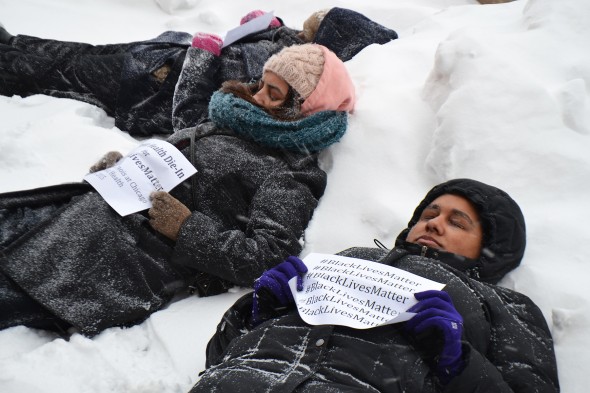Student ‘die-in’ takes stand against social injustice

Students participate in a 4.5-minute Public Health Die-In Feb. 4 outside the School of Public Health to show solidarity with #BlackLivesMatter. Photo: Sara Giloth
By Jamel Russell and Wesley Epplin
At its best, public health is part of a broader movement for social justice. We who work in public health must take actions that actively devalue and eliminate social injustices in our society.
About 50 students, staff, alumni, faculty and community members joined in the Public Health Die-In for #BlackLivesMatter Feb. 4, sponsored by Minority Students for the Advancement of Public Health and Radical Public Health. The group gathered to stand up (and die-in) for the cause of justice and publicly reaffirm that #BlackLivesMatter to public health.
The action was a statement that the extreme injustices of state-sanctioned violence, mass incarceration and over-policing — which disproportionately are targeted at minority and poor communities —make up an assault on the health of the impacted individuals, families, communities and our broader society.
The Public Health Die-In for #BlackLivesMatter was followed by a teach-in Saturday at the School of Public Health that brought in about 180 students, employees and community members.
#BlackLivesMatter is a movement for equality and justice, which public health as a field should fully join. We cannot expect to achieve health equity — an overarching goal in the CDC’s public health agenda, Healthy People 2020 — while police brutality, over-policing, and mass incarceration continue to hurt our communities.
What more can we do? For starters, every student in the UIC School of Public Health should graduate with an understanding of the history and context of mass incarceration and police brutality, and how they are major drivers of inequity and unhealthy consequences in our society, leading to more inequitable distributions of money, power and resources.
Public health practitioners and researchers should be prepared to confront these systems of social injustice, including joining with the existing movement against this oppression, and classroom learning must better include these topics.
So, to repeat our demands from the Public Health Die-In for #BlackLivesMatter, we are demanding that schools of public health and the broader public health community include in their curriculum, research and practice:
- the issues of police and state-sanctioned violence, over-policing and mass incarceration
- the manner in which these disproportionately harm minority and poor communities
- social justice movements, including the #BlackLivesMatter movement, and how public health can work with them to advance toward health equity.
We will actively confront this injustice. Join us. Speak up. These topics belong in the classroom and in our public health planning efforts, and we all belong in the street, adding to the demand for justice.
– Jamel Russell is president of Minority Students for the Advancement of Public Health and Wesley Epplin is a UIC School of Public Health alumnus and facilitator for Radical Public Health.
